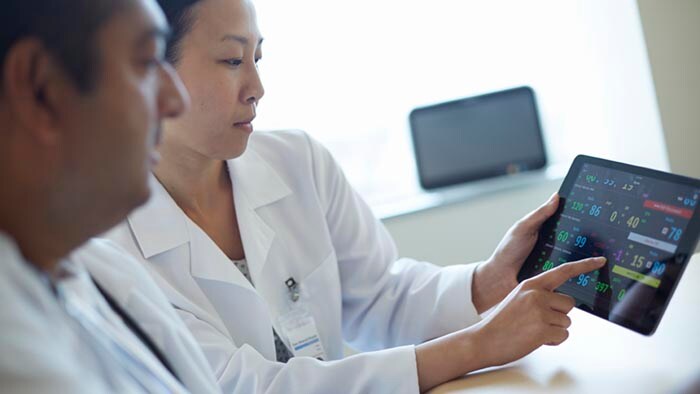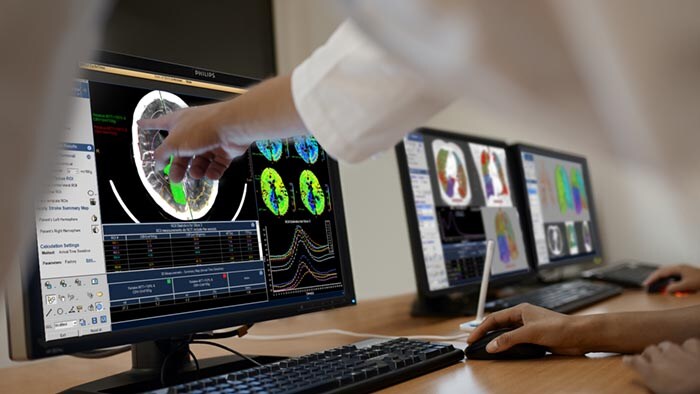Let’s step into a time machine and travel to the year 2030 for a moment. You have been experiencing pain in your knee, and you are not sure what’s wrong. Will you be diagnosed by a doctor, or by an artificially intelligent machine? Based on future scenarios as depicted in Hollywood movies, you may wonder whether we are set for a machine takeover in many areas of life, including healthcare. Although that may sound like a fascinating idea to some, the contributions of artificial intelligence (AI) to healthcare are likely to be much more subtle, with AI supporting physicians rather than replacing them. At Philips we believe that the needs of the healthcare provider and the patient should always be at the forefront, with technology adapting to their needs, extending their abilities, and helping them achieve better outcomes. We call this adaptive intelligence. You can imagine adaptive intelligence as an invisible personal assistant that operates in the background, helping doctors to deliver the best possible care.
AI is all around you
Before exploring in more detail what a future of adaptive intelligence in healthcare could look like, let’s take a step back and demystify the concept of artificial intelligence – or AI, as it is often referred to. For many people, AI conjures up futuristic images of humanlike robots. But in reality, AI has been around since the 1950s and is not necessarily linked to robots. AI is a branch of computer science that encompasses a wide range of methods. The unifying goal is to develop computer programs that mimic human intelligence, ranging from simple pattern recognition all the way to reasoning and problem solving. These programs can be implemented in a robot, as Hollywood has always been eager to show, but they could also run on your smartphone or on any other device. Another term that you will hear a lot in the context of AI is ‘machine learning’. It is one particular method within the broader field of artificial intelligence. Machine learning helps a computer program to make sense of large amounts of data, learning the patterns that emerge as the program is fed with data over time. Now if that all sounds a bit abstract, you only need to look around to see how AI is already present in your everyday life. For example, Google uses machine learning to suggest search terms as you type, based on your past searches, what is popular now, or your location1. Similarly, when you browse for movies or a series on Netflix, machine learning algorithms analyze your viewing history and trends across viewers, to provide tailored suggestions2. What these examples have in common is that AI offers you a helping hand, adapting to your needs and preferences. This is precisely how healthcare can benefit from AI as well.

A helping hand in healthcare
You may not realize it when you step into your doctor’s office, but in many ways, your doctor faces the same challenges that all people face in the modern world: they have access to an infinite amount of information, but there’s only so much time to make sense of it all. Or, in your doctor’s case, to set the right diagnosis and select the best treatment plan for you when you’re sick. Let’s take radiology as an example. Radiologists specialize in diagnosing and treating disease and injury through the use of medical imaging techniques such as MRI, CT and X-rays. As populations age and the demand for healthcare grows, the workload of radiologists keeps mounting. Based on 255 uninterrupted eight-hour workdays per year, a radiologist now needs to review one image every three to four seconds to meet workload demands.3 They also need to consider the individual situation and medical history of the patient. Radiologists have too much data, and too little time. That’s where AI can help. Techniques such as machine learning enable healthcare providers to analyze large amounts of data, allowing them to do more in less time, and supporting them with diagnosis and treatment decisions. For example, suppose you feed a computer program with a large amount of medical images that either show or do not show symptoms of a disease. The program can then learn to recognize images that may point towards the disease. For example, researchers at Stanford developed an algorithm that helps to evaluate chest X-rays to identify images with pneumonia.4 This doesn’t mean, however, that the radiologist will no longer be needed. Instead, think of AI as a smart assistant that will support doctors, alleviating their workload. This is also how we approach AI at Philips: we work together with clinicians to develop solutions that make their lives easier and improve the patient experience. That’s why we believe in the power of adaptive intelligence. It’s not really about AI per se – it’s about helping people with technology that adapts to their needs and extends their capabilities.

The changing role of doctors
So how will AI change your healthcare experience? The truth about AI - or rather, adaptive intelligence - is that you probably won’t notice it at all, at least not in the foreseeable future. It will be there, in the background, but it won’t be in the form of a robot with a white coat. In the near future, the greatest gains to be made are by speeding up workflows for doctors and supporting them with relevant insights. When computers assist with mundane and repetitive work, like crunching health data behind the scenes, your doctor will have more time for you. His or her role will continue to be just as important – it will simply evolve, supported by intelligent technology. For example, some radiologists are already using technology that automatically analyzes the images that they are looking at, offering them the most relevant tools to make a diagnosis. It’s a bit like Google Maps, which offers you different information depending on the place you click: opening hours for a library, access to the menu and options for booking a table if it’s a restaurant. In both cases, technology doesn’t replace people, but it allows them to achieve their goals more efficiently. Adaptive intelligence could also help to reduce waiting times in hospitals, by optimizing schedules for physicians and patients. We all know how frustrating it can be to wait for an examination when we visit a hospital. Physicians also lose a lot of time every day, waiting for patients or lab results. With the support of smart algorithms, hospitals could plan more efficiently, saving valuable time for both patients and physicians. A hospital’s scheduling system could also take into account patient risk profiles, so that if you are at higher risk, you will get your examination results more quickly.
AI in your pocket
The rise of adaptive intelligence will not be confined to the walls of a hospital. Over time, adaptive intelligence will increasingly become embedded in mobile and wearable devices, helping you to keep track of your own health. Gartner recently predicted that by 2025, 50 percent of the population will rely on “virtual personal health assistants” for their routine primary care needs. These virtual health assistants would help you set your own health objectives, provide you with personalized tips, and alert you when you actually need to see a doctor. Recent advances in connected care already allow physicians to remotely monitor at-risk patients for early signs of deterioration, allowing these patients to stay in their home environments with their loved ones close by. Algorithms based on machine learning can help identify adverse events, triggering professional care when needed. To summarize, we believe that the future of healthcare is a positive one, with AI supporting healthcare providers and patients alike – adapting to people’s needs and extending their abilities, to help them achieve better outcomes. 1 https://medium.com/@DonDodge/how-is-google-using-machine-learning-adff7bfdc333 2 https://medium.com/netflix-techblog/tagged/machine-learning 4 https://news.stanford.edu/2017/11/15/algorithm-outperforms-radiologists-diagnosing-pneumonia/
Share on social media
Topics
Author

Innovation matters team
Innovation Matters delivers news, opinions and features about healthcare, and is focused on the professionals who work within the industry, as well as Philips as a cutting-edge health technology organization.












